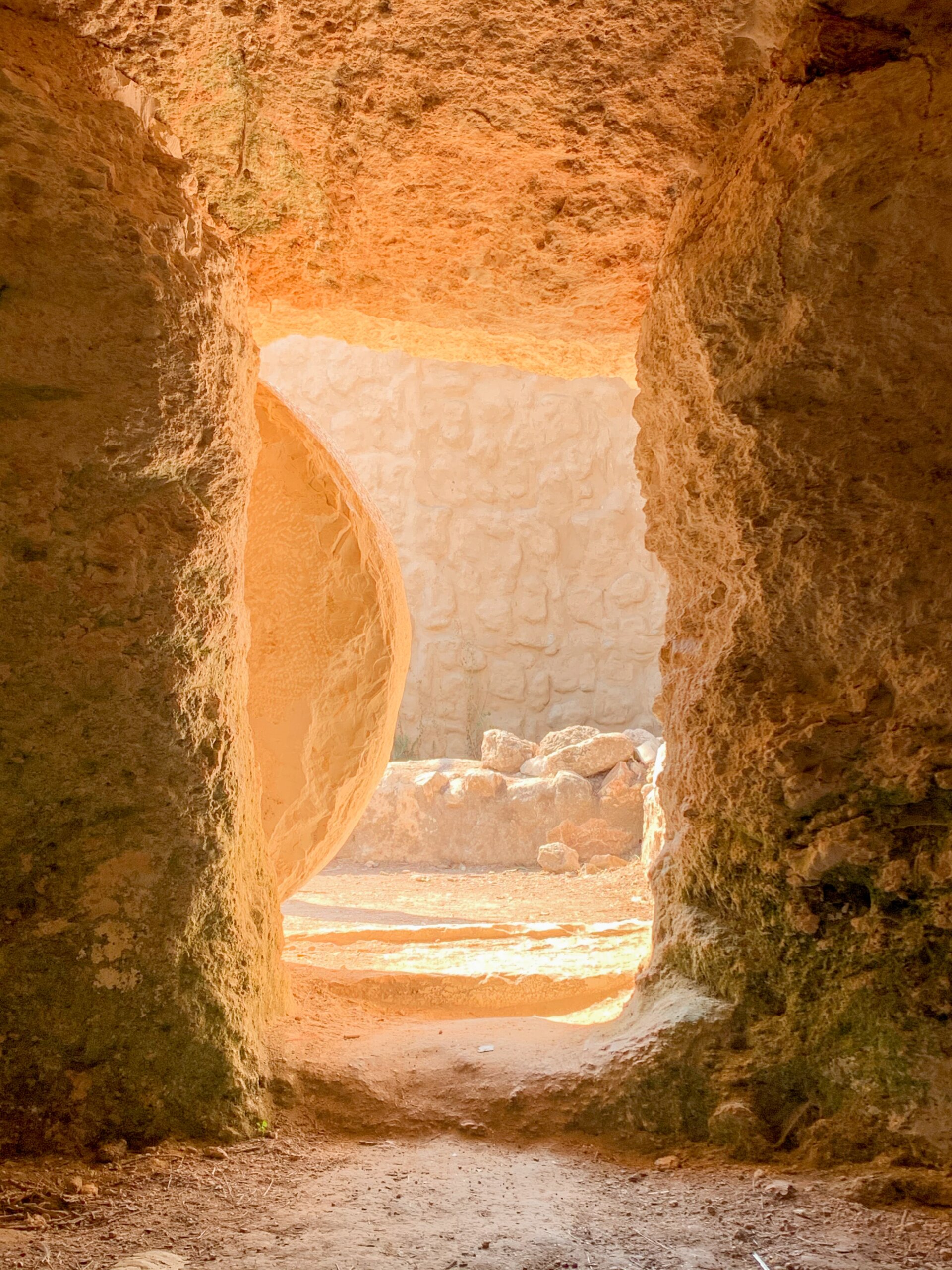“Which of your Eids is bigger?” my Muslim friend kindly inquired one lazy afternoon. Her mahogany eyes glistened with curiosity as she waited for my response. Two of the largest holidays of the year for Muslims are Eid—one was big Eid (lasting four days) and the other small Eid (a three-day celebration).
I hesitated. I had never given much thought to whether Christmas or Easter was “bigger.”
I picked up my cup of green tea, cardamom wafting through the air, and took a sip to stall. As I reflected on American culture, it seemed like Christmas was the holiday everyone scurried to participate in some way. Festive lights twinkle on homes and in apartment windows. Friends and families gather for parties. Children write letters to Santa and open Advent calendar doors. Garland and red bows adorn poles throughout downtowns across the country.
Easter, on the other hand, seemed relinquished to a three-day weekend, egg hunts, and a single meal. It seemed Americans spent more time celebrating Christmas.
“I think Christmas is our big Eid and Easter is our small Eid,” I cautiously replied. But as the words tumbled from my lips my answer felt like a wrong note played during a piano recital.
Dissecting culture from celebrations
According to a survey by Gallup, 93 percent of Americans celebrate Christmas while The National Retail Federation estimates 79 percent celebrate Easter. More Americans are content to celebrate Christmas than Easter.
While Christmas is the biggest holiday in America, Easter should be of greater significance for Christians. The resurrection impacted the ancient church so much that they changed the community day they worshipped God on for centuries from Saturday to Sunday—the day Jesus rose from the grave.
Our understanding of what holds significance in our lives should be shaped by what the Bible teaches rather than society. Our culture can easily steer us away from grasping this reality; only two percent of Americans consider Easter to be the most important religious holiday.
As I returned home after visiting my friend that day, I pondered my answer. Perhaps I had allowed culture to creep into my heart and captivate it more than it should.
Christmas is a significant religious celebration for believers and we don’t need to celebrate it less, but I wondered if Easter truly held the same value in my heart. Did I anticipate and rejoice in the resurrection and Easter as much as the coming of the Messiah at Christmas? I feared perhaps not.
The importance of the resurrection
Culture can subtly dictate what we prize and we must remind ourselves of the priceless nature of the resurrection—again and again. In Paul’s letter to the Corinthians, the church was struggling to be set apart from the culture, resulting in sexual immorality (1 Corinthians 5:1), idolatry (1 Corinthians 10:14), and incorrect theology about the resurrection of believers (1 Corinthians 15:12). Scripture exhorts believers to pursue the path of holiness as his beloved people (Deuteronomy 7:6; Leviticus 20:26; 1 Peter 1:15; 1 Peter 2:9). Throughout his letter, Paul speaks truth in love to the Corinthians so they can realign themselves with the gospel and fight against worldliness.
The battle against culture and our minds can be treacherous and hard to see when we are in the midst of it. Even as Paul corrects the mistaken theology of the church, he highlights the centrality of the resurrection to our faith and points us to be mindful of how society can shape our thinking and actions. Diving into the past, future, and present implications of the resurrection that Paul lays out for the Corinthians can instruct us in exalting Christ as we face the pressures of the world.
Past implications of the resurrection
Paul argues how the resurrection impacts our past in that “if Christ has not been raised, your faith is futile and you are still in your sins” (1 Cor. 15:17, ESV). The apostle penned this letter to the Corinthians because some doubted that believers would be raised with Christ after death; Paul sought to remedy this false belief. While no one doubted Christ had risen, their questioning if believers would also be raised was tainted with popular culture. Christians must hold fast to all the Bible teaches, not select which elements off the Bible menu they want to follow.
Our faith hinges on Jesus’ raising from the dead. If Jesus was only born on earth, lived a perfect life, and died on the cross, we would not celebrate Christmas or Easter. For example, imagine you are part of a disaster relief team to provide aid after an earthquake. After making all the necessary arrangements for supplies and travel, you board the plane, but instead of landing at your destination you opt to return home. Would you say you provided help to others after the earthquake? Certainly not—because you never reached your intended audience.
Likewise, while Christ leaving the riches and splendor of heaven is mind boggling, unless He paid for our sins and reigns over death, we would remain hopeless. Christmas is of the utmost importance and deserves time to reflect and celebrate Jesus becoming the God-man, but the resurrection secures our eternity and fulfills Scripture (Psalm 16:10; Isaiah 53:10, 11).
What we most needed was Jesus to end the death Adam brought through sin along with eternal freedom from God’s wrath (1 Corinthians 15:21, 22). We needed Jesus to pay the wrath of God and provide forgiveness for our rebellious, overflowing-with-sin hearts, which he did out of love for us (1 John 4:10). If we don’t think Jesus’ death on the cross was sufficient, then death would have the final word. But the resurrection’s answer tells us otherwise—we have forgiveness and life. We cannot stop at the manger or cross, for our hope is found in Jesus becoming alive again (Ephesians 2:5; Romans 5:18).
Future implications of the resurrection
Since Christ has risen from the dead, we also benefit from what will transpire in the future. Jesus will one day reign over all (1 Corinthians 15:24-28) and because of our union with him, we will also be raised to new life without our tainted sinful nature (1 Corinthians 15:20, 22). Believers get to follow in the footsteps of Jesus’ resurrection since he is the “first fruits” (1 Corinthians 15:23). The first fruit is a sample of what the rest of the crop will be. In the case of Jesus’ resurrection, his triumph over sin and death (1 Corinthians 15:26, 27) means we as believers can look forward to the day when we will also be raised to eternal life with our Savior and death cannot overcome us.
Present implications of the resurrection
Finally, the resurrection of Jesus directs our daily lives. “If in this life only we have hoped in Christ, we are of all people most to be pitied” (1 Corinthians 15:19) then our faith is worthless. But we know Christ has risen (1 Corinthians 15:20) so the difficulties we experience in this life don’t have the final say. Paul explains how it’s worth risking everything to follow Jesus because we are heaven bound (1 Corinthians 15:48) and one day we will be given imperishable bodies like our Savior (1 Corinthians 15:54). Our obedience to Christ matters even when the world cannot see how because “in the Lord your labor is not in vain” (1 Corinthians 15:58)—we are compelled to joyfully keep serving Jesus.
Despite the difficulties we may face or the sacrifices we make in following God, we know there is more beyond these present struggles. This we will understand more clearly when we are face-to-face with Jesus in heaven. All the struggles of this world will pale and we will be enraptured in love for our beloved Savior whose resurrection we have been united with forever and always (1 Corinthians 6:14) because in God’s “presence there is fullness of joy” and “pleasures forevermore” (Psalm 16:11). One day we will be with God forever—and this gives us hope and an eternal lens to endure what we face.
Easter is greater
As I mulled over my answer to my friend, I saw the discrepancy between American culture and Christianity. I had given a correct answer for Americans—Christmas is a bigger deal than Easter. But as a Christian, Easter should emerge greater because the resurrection provided the forgiveness of sins necessary to be right with God again and paved the way toward hope beyond this broken world.
The hope and eternal security the resurrection extends to believers does not diminish Christmas, but validates the need for both—the first coming of Christ and the fulfillment of Scripture through the resurrection of the Messiah. Since Jesus has fulfilled Scripture and redeemed people from every nation, we have great joy today and for all eternity!
We should enjoy Christmas and exemplify the true reason for celebrating it in our culture, but we must also strive to ensure Easter is not downgraded in our hearts. We don’t need to do more for Easter—in fact that would be the opposite of the gospel—but we can marvel at what Christ has accomplished and the way it informs how we live today.
The next time a Muslim friend asked me which of my Eids was bigger, I didn’t hesitate. I knew Easter was greater. And as crocuses bloom and blue robin eggs hatch, may our hearts burst with joy because our Savior lives, will reign over all, and supplies endless hope.
Practical takeaways
- How have you noticed culture creeping into and captivating your heart? Spend a moment confessing this to the Lord and ask him to realign you with the gospel and to fight against worldliness.
- Which implication of the resurrection (past, future, or present) most resonates with you? Take a minute to praise God for this beautiful truth.
- Meditate on 1 Corinthians 15:3, 4 which states, “For I delivered to you as of first importance what I also received: that Christ died for our sins in accordance with the Scriptures, that he was buried, that he was raised on the third day.”
This article was originally published on Momma Theologians.
Consider a few extra resources:



